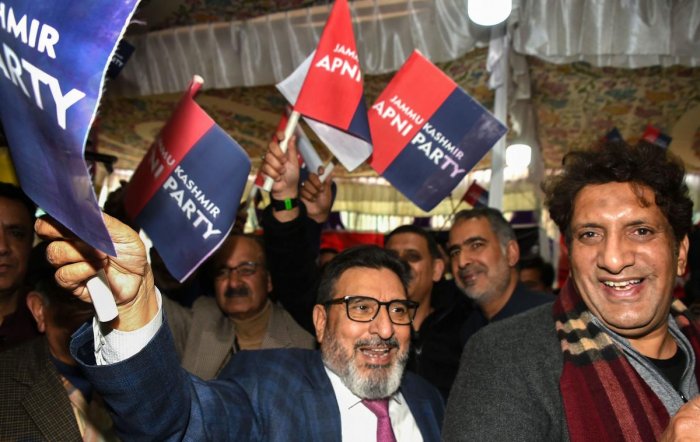After abrogation of Article 370 on August 5 last year, first signs of political activity returning in Jammu & Kashmir have emerged in the newly carved out Union Territory. In what is being described as the first major political initiative since the August 5 move, a new political party has been constituted by former PDP leader and Minister, Altaf Bukhari.
As per Bukhari, the newly formed party- ‘Apni Party’ has been launched with the sole purpose of carrying out development in the Union Territory. Several prominent names- Usaman Majeed, Dilawar Mir, Javid Baig, Shoiab Lone, Ajaz Khan, Rafi Mir, Vikram Malhotra, former Chief Secretary Vijay Bakaya and Ghulam Hassan Mir, who have joined the ‘Apni Party’ after quitting from different political parties, particularly the PDP and the Congress were present during the newly formed party’s launching ceremony.
Bukhari said, “The issues like self rule and autonomy do not figure on the agenda of ‘Apni Party’.” He added, “Its sole purpose is to strive for development and politics of truth.”
This shows how Jammu & Kashmir politics has moved on from the acrimonious agenda of the Hurriyat that was backed by the Congress, the PDP and the National Conference. Issues like self rule and autonomy often meant separatism and secessionism in the erstwhile state of Jammu & Kashmir.
Taking a veiled dig at the two dynastic, regional satraps in Jammu & Kashmir- the National Conference and the PDP, Bukhari said that the newly formed party will not behave like the dynastic ones and the party president will be elected on a rotational basis.
Till now, Jammu & Kashmir has been ruled for a major part by two dynasties- the Abdullah dynasty and the Mufti dynasty. But now it seems that the era of dynasties is going to end in Jammu & Kashmir just like it has ended in other parts of India.
There is a clear reduction in political demands in the Valley, which no longer seem to be manifesting separatist tendencies. On being asked about Article 370 abrogation, Bukhari said, “If I don’t accept the abrogation of Article 370, will the decision change?” Thus, it seems that it has been accepted that the decision is irrevocable.
Bukhari also tried to place himself on better terms with New Delhi. He said, “We have to do business with Delhi irrespective of who is ruling.” He added, “We want to end the mistrust between Srinagar and New Delhi.”
Bukhari also brought up issues of statehood and domicile for the people of the Union Territory. He also said that his party is a regional party with a national outlook.
Thus, there are two key takeaways from the launch of this new party. Firstly, the era of Abdullahs and Muftis is all but over. There is a popular sentiment against the dynastic politics of the NC and the PDP.
Secondly, it can be safely said that willingly or unwillingly the political elements in Jammu & Kashmir have come to accept Article 370 abrogation as a reality. They understand that the Modi government won’t allow anyone to raise separatist demands in Jammu & Kashmir. Therefore, they will have to restrict their political activity in the broader framework established by the August 5 move. Secessionist tendencies in political activity is a thing of the past. If local parties have to survive, they will have to keep the narrative limited to legitimate issues of development and demand of statehood.
